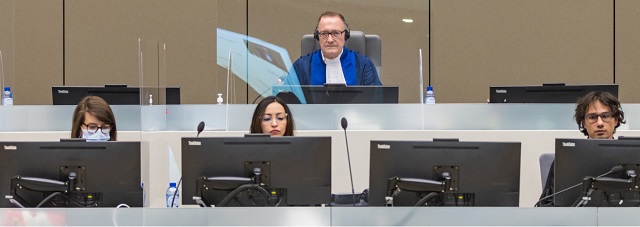
“So, the judgement has happened. Well, we forgive him, but to my own opinion I would say they bring him back home. And then he serves his sentence from back in Uganda and in northern Uganda.
Not just leaving him there. Because we really want to see what’s happening in the jail,” said Lakot.
When The Independent spoke about the sentencing with Betty Aol Ocan, the outgoing Leader of Opposition in Parliament and the Woman MP of Gulu Municipality, she said the sentence was unfair to Ongwen.
“Ongwen deserves sympathy,” she said echoing sentiments she had expressed the day Ongwen was arrested and jettisoned to The Hague in 2015.
“Ongwen was abducted as a child and was conscripted into the Lord’s Resistance Army from where he started committing those atrocities,” she said, “It is clear that his parents failed to protect him, his local government failed to protect him, and the national government failed to protect him. So I find it unfair that he is going to serve 25 years in prison.
“I hope his lawyers help him to appeal the sentence,” Aol told The Independent.
Aol explained that in Uganda, there are many people who have equally committed similar if not worse atrocities but they are living “scot-free.”
She was possibly referring to another LRA commander, Brig. Sam Kolo who was the chief LRA negotiator in the face-to-face talks with the government in 2005 and surrendered to government forces and was granted amnesty, became a free man and in 2012 graduated with a degree in business studies from Gulu University. Under Uganda’s then Amnesty Law, former soldiers of the LRA who denounced rebellion could be allowed to regain their freedom and rejoin society.
There are also others like Thomas Kwoyelo and Caesar Acellam, the top LRA commander who was reportedly captured by the Ugandan army in the Central African Republic and are in Uganda government custody as they undergo trial in Uganda’s High Court Division of International Crimes since the country domesticated the ICC Rome Statute.
Aol said if Ongwen were to successfully appeal his sentence, a punishment that would see Ongwen do community service “back here in Uganda would be more appropriate.”
Ongwen was arrested five years ago in the jungles of the Central African Republic by the Seleka rebels and quickly handed over to the U.S army which at the time was giving back-up to the AU Regional Task Force set up to fight the Joseph Kony-led Lord’s Resistance Army (LRA). He was then flown to The Hague to face trial at the ICC.
Most of Ongwen’s accusations arose from a 2004 attack on an Internally Displaced Camp in northern Uganda where hundreds of civilians were massacred in a single night allegedly by LRA rebels under his command.
The ICC Prosecutor accused Ongwen of allegedly being criminally responsible for murder, serious bodily injury and suffering and enslavement as crimes against humanity, and for murder, cruel treatment of civilians, intentionally directing an attack against a civilian population and pillaging as war crimes.
The Chamber decided to give certain weight in mitigation to the circumstances of Dominic Ongwen’s childhood, his abduction by the Lord’s Resistance Army (LRA) at a very young age and his early stay with the LRA.
Indeed, from the time he was arrested, Ongwen attracted some sympathy, especially from his Acholi community. Many wanted him brought back to Acholi so he faces the local justice system known as “Mato Oput.”
Before he was arrested and dispatched to The Hague, the official account was that Ongwen was born in Paibona, Awach, in Gulu District in 1980. The other belief was that he was abducted as a child while going to school at the age of 10 in 1990.
But when he spoke for the first time on Jan. 26, 2015 before the ICC Pretrial Judge, Ekaterina Trendafilova, Ongwen said he comes from a small place called Coo-rom, Lamogi Sub-County in Amuru District.
“I was born in 1975 and was abducted in 1988 and taken to the bush when I was 14 years old,” Ongwen told pre-trial judge Trendafilova when asked to introduce himself, state his date and place of birth as well as his current occupation.
Ongwen said he was unemployed although prior to being captured and transferred to The Hague, he was a soldier in the Lord’s Resistance Army.
Ongwen said to be the father of 10 children spent most of his childhood and his entire adult life in the LRA just like tens of thousands of children in northern Uganda, South Sudan, the DR Congo and the Central African Republic. He was then indoctrinated and forced into committing appalling acts before he even became a teenager.
He would then be taught at an early age that he was fighting for the rights of his people—the Acholi. He was also told by Kony and grew up knowing that as long as he obeyed Kony’s orders—which came directly from the Holy Spirit, he would be innocent in the eyes of God.
Ongwen in turn sought to please his boss and often followed those orders and often excelled at executing them—the reason he rapidly grew through the ranks first; becoming a Major at 18 and a Brigadier in his late 20’s. In 2005, the ICC indicted Ongwen on seven counts including enslavement. This made him the first person to be charged by the Court for committing the same crime committed against him.
But the ICC Chamber rejected the Defence’s arguments, recalling its analysis of evidence in the Judgment issued on 4 February 2021, and considered that the mitigating circumstances of substantially diminished mental capacity and duress are not applicable.
 The Independent Uganda: You get the Truth we Pay the Price
The Independent Uganda: You get the Truth we Pay the Price



